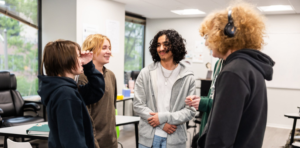Parenting
This fall, parents around the country took a deep breath and cautiously, worriedly, and maybe even gleefully sent their children back to school for a return to in-person learning. As our students return to school, parents may still be filled with anxiety asking themselves questions, such as: Will my child be safe at school? Will my child like being back at school? Do they remember how to be a student? Will they remember how to interact with others? Will their anxiety lesson once they get used to in-person learning again? Will my anxiety ever decrease? So, what can we do? How can we support our children and reassure ourselves? Tips to Help Manage the Return to In-Person Learning Most of us are trying to navigate our own anxiety as we try to smile bravely and encourage our children to return to school and trust that it will all go well. …
Read MoreWhat if a high school has no grades? No Advanced Placement (AP) classes. No International Baccalaureate (IB) program. To most parents in Northern Virginia, this is profoundly unsettling information. They ask, “How will my child get into college?”. The current model is not working for many students, but parents are afraid of the unknown. What they don’t know is that a progressive high school like The Sycamore School (TSS) may be precisely what they need to get into college. The college admissions process has changed dramatically since most parents were in high school. More students than ever are applying to college and acceptance rates have dropped considerably. In 1970, 152,000 students were enrolled in college, by 2000, that number had increased to 382,000 students who were enrolled in college in Virginia. [EducationData.org; July 2021] This is a particular challenge in Northern Virginia, where nine out of the top ten top…
Read MoreWe strive to do our best as parents and teach our children how to grow up to be self-sufficient adults. We also want them to become kind and generous adults. Good people. I recently read an article titled For Families: 5 Tips for Cultivating Empathy which reminded me that raising kind and generous adults is not an easy task. How do we cultivate empathy in our children? Our children learn from our actions more than our words. They pay attention to what’s important to us, how we spend our time, and how we treat others. If we want to cultivate empathy in our children, we need to model that behavior ourselves. How do we treat others? Not just our friends, co-workers, and family members who we deem to be our peers, but also the many individuals that make up our community, including waiters, cashiers, custodians, solicitors, and mail delivery people?…
Read MoreParents, help mitigate panic and communicate realistic expectations to your children. It feels as if individuals are falling into two camps in response to the Coronavirus outbreak: panicking or dismissive. Neither reaction is helpful. Instead, we need to take preventative measures seriously and think beyond ourselves. Panic: A Selfish Response Panic can bring out the worst in some: people stealing masks from hospitals, hoarding hand sanitizer, and buying caseloads of water. These reactions show a regression to thinking only of ourselves and our own basic needs and not being mindful of the impact these actions have on others in our community. What happens if people don’t have access to basic supplies because other people hoarded? Social Distancing: It’s Not About You Are you in the dismissive camp when it comes to the seriousness of the pandemic and the need for social distancing? This is a little more subtle, but important.…
Read MoreMore and more frequently, parents of young students are pushing for their child to be identified as “gifted and talented”. Parents might think they are benefitting their children by advocating for that label and, to be honest, parents like the recognition themselves. We must have done all the right things if our child is identified as “gifted and talented” at an early age. But is this what’s best for our children? An article in Time Magazine speaks to our country’s dated and erroneous idea that learning potential is a fixed trait and cannot be cultivated. This results in bright students perpetually striving to prove their worthiness. It also channels educational resources to a small segment of students, failing to challenge and inspire the rest of our youth. At the heart of the article is three decades of research by Stanford psychologist Carol Dweck and her work on growth…
Read MoreAt some point, every parent has nagged their child. It is just in our nature as parents. We nag because we are frustrated and don’t know what else to do. We want to instill some life skills in our kids, but they’re not internalizing them. Nagging puts us in charge of tasks our kids should be responsible for and focuses on what our children are NOT doing. Common tasks parents nag kids about: Homework Chores Cleaning the room Walking the dog Taking out the trash Picking up after themselves Does nagging work for your family? It certainly doesn’t for most families. The result of the constant reminders simply makes our kids feel incompetent with no change in behavior. Nagging is short term and repetitive. It doesn’t lead to a long-term solution, like actually instilling the desired behavior in the child. Nagging instead sends a message to our kids that…
Read MoreLate, Lost or Missing Homework? Uncovering and Addressing Executive Functioning Struggles In Students Another week and another missing assignment in the grade book for your student. It seems like all their peers complete and turn assignments in on time, so why is it so hard for your child? Late, lost or forgotten homework can be a sign that your student is struggling with executive functioning skills, which are the building blocks of productivity. Executive functioning allows you to organize your day, plan long and short-term projects, and remember to complete tasks. The National Center for Learning Disabilities defines “Executive Function” as a “set of mental processes that helps us connect past experience with present action.” How do you determine if your student’s struggles are age-appropriate or if they are a symptom of an executive function issue? One option is to ask your school to do an evaluation, or student…
Read More- « Previous
- 1
- 2
- 3
- 4
- Next »











